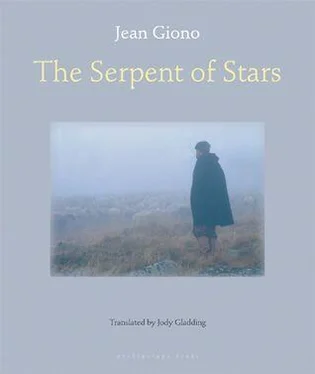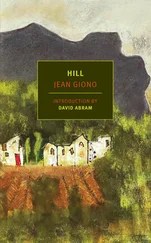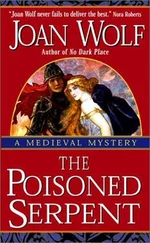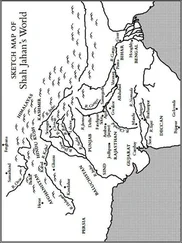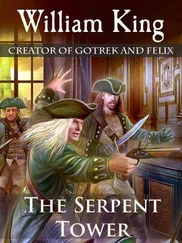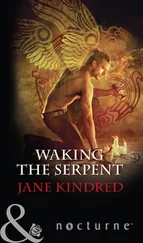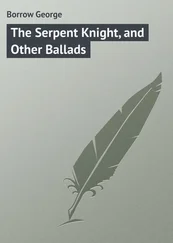He takes three steps, he disengages himself from the semi-circle of the elements. Slowly, he kneels; he lies down belly to the earth; he embraces the earth with his outspread arms. We hear him say:
Earth!
Earth!
We are here, it’s us, the masters of beasts!
We are here, it’s us, the first men!
There are some among us who have kept their hearts pure.
We are here.
Do you feel our weight?
Do you feel how we weigh more than the others?
They are here, those men who see the two sides of the tree and the inside of the stone, those who walk in the thinking of the beast as in the wide meadows of Dévoluy above the well-loved grasses.
They are here, those who have leapt the barrier!
He remains for a brief moment not saying anything, waiting for a response that doesn’t come and he cries his great cry of defiance:
Do you hear, Earth?
We are here, it’s us, the shepherds!
All the instruments fall still at the same time. Silence!
You can hear the fires crackle.
And it’s over.

I HAVE not spoken of the music for some time. Never did it stop playing a part in the drama. Never did it stop being another drama beside the drama, full of reflections, in which leaves became foliage and the image of one hill became the rolling sea of the whole hilly country. During the last scene, when the narrator kneels and lies down on the earth, the most beautiful song of rejoicing breaks out, the most beautiful song of the world, the most charged with hope, but the task that I had imposed upon myself, which was to capture it word for word, to follow the text with all my attention, prevented that swaying abandon which alone could have carried me through the images of that music. Nevertheless, I still have a few of them under my eyelids; they are there, as hard as grains of sand or as soft as tears.
WE UNTIED the mare. Already, the herds were heading off; already, far off, above, in the Sisteron passes, the tide of beasts sounded like the great rolling waters.
Césaire went off to find water for the mare to drink. The little sorceress lay down in the bottom of the cart. The two of us, Barberousse and I, stayed there, with no will to do anything, bruised and softened from all sides, bathed in the bath of life like that god at the beginning who washed himself with the sky, and we watched the trembling lantern of dawn lighting up.
The aeolian harp players passed close to us, returning from their heights. They spoke loudly, with voices full of young laughter. Barberousse recognized among them the voice of a friend and cried, “Greetings, Boromé!”
“And who is that?” said Boromé, stopping himself mid-conversation.
Then he moved forward, recognized Barberousse, and they embraced heartily, beard to beard. Despite his laugh, Boromé was also an old shepherd, gray-haired, skin all hollowed by the scars of time.
“You get the smallest share,” I said to him.
He answered me, “Why is that?”
“Because you harp players are so far away, up above, and you can’t hear the beautiful speeches.”
He said to me, “No, don’t think that. Shares! Who’s to say who gets the biggest share! We are alone on top of the hill, with our sounds. We say what we want to say, without words.
“We look at the sky. And just now, high up in the middle of the night, I saw a great serpent of stars! It’s enough to imagine.”
A complete translation of Scene IV of the Shepherds’ Play
THE GREAT SILENCE HAS COME. The narrator is without words, there, between the fires. He has just spoken the words which must bring about man’s birth. The play needs a man with his terrors, one of those from before the waters, wide eyes trembling like bees, mouth open over his ecstasy, his fear and his drool. And if such a man is present, it’s only by chance. It takes a shepherd with a heavy heart to do this man, and you don’t always find him because that heaviness of heart (as Barberousse explained to me) comes from the sediment misfortune leaves in man. Many misfortunes, much sediment, and a heavy heart.
Great silence. Here and there, a ram’s bell rings. A shepherd stands up. He doesn’t move forward into the stage clearing. He remains in the middle of the audience. The narrator has heard the noise of the shepherd who has stood. He turns his way. He greets him in silence, raising his left hand. The shepherd greets the narrator, also raising his left hand, and then, shrugging his shoulders, he sheds his heavy homespun cloak.
THE MAN (He cries slowly, in a high-pitched voice). Lord, I am naked, and you have tossed out handfuls of fleece and foliage.
Lord, I am naked, and you have given the claws from your hands and the toenails from your feet to the beasts.
Lord, I am naked, and you have given me a poor heart all sick with wind like the bell of little flowers.
THE NARRATOR (who plays the role of the world. He speaks in a solemn voice and a muted gargoulette that accompanies him lowers the tone further still). And man will be upon me like a mountain among mountains; he will flow with forests, he will walk, dressed in all the hair of the beasts.
He will be the lion among lions: the odor from his mouth will terrify the lambs and fawns, and even the birds high in the air, those who are like the bell of little flowers.
He will be the summit among summits: his head will climb to meet the stars and with his blue gaze he will count the stars, like sheep in the folds of the pastures.
THE MAN. Lord, I am naked, and your pity has bent over the water and not over me. And you have given the water, with its beautiful green skin, that garb of grasses and trees, and you have told that skin that it would make the spray, and your sun lights that spray with a higher joy than the most wide open flowers.
Lord, I am naked, and your pity has bent over the water and not over me. And you have given the water a wide body that strikes the mountains and the sands, flesh that runs through claws, a depth in which sleeps silence more beautiful than woman. You have made water the never wounded, the forever living, unique, eternal, without pain or demise.
Lord, I am naked, and your pity has bent over the water and not over me. And you have given the water the joy of fits of rage, and you have given it that honey which is a song, a flow beneath the grass. Ah! Lord, they are under the willows, and the swaying of the brambles, so beautiful, those songs, so pure, so right, so round with the lovely line that closes the world, that nothing is left to me but the freedom of groaning.
THE NARRATOR. He will walk over the waters.
He will have the round seas crushed under the arches of his feet like rotten fruit.
He will go off over the waters at his easy pace.
He will have wide wooden shoulders and he will swing his wooden shoulders walking over the waters.
He will make himself wings with the white grasses, his chest will be like a wishbone from a goshawk and he will go off over the waters to meet death full of images.
THE MAN. Lord, I am naked, and you have bound me wrist and ankle and you have thrown me to the cold earth like a kid to be slaughtered.
Lord, I am naked, and you have shown me your wide hands full of salt, and you whistled between your lips as if to call me, and I followed you as far as the salt stones 9 because I was hungry for that good bitterness.
Читать дальше
